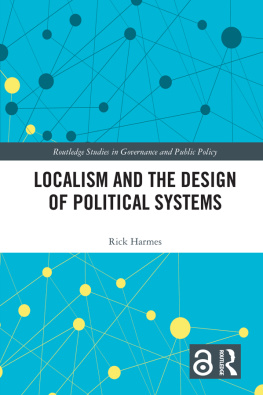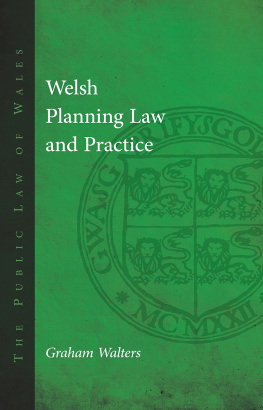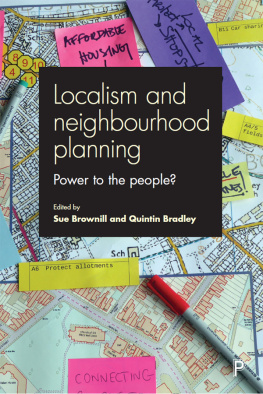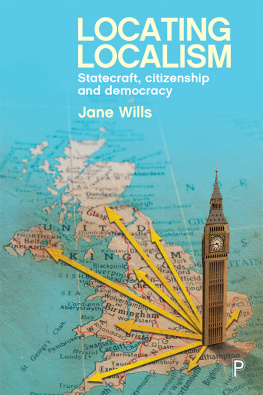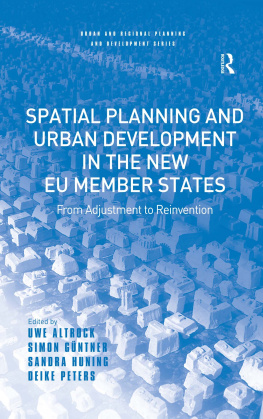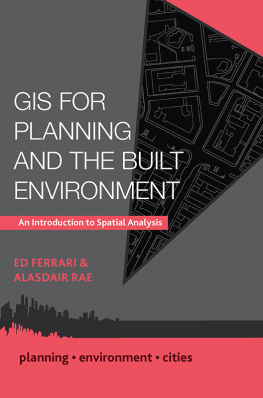
Spatial Planning and the New Localism
This book assesses the transition from New Labours Spatial Planning approach to the Coalition governments preferred Localism approach. Localism, we are told, will liberate local planners from the heavy hand of central government and allow planning to flourish at the local level. Alternatively, nation-wide austerity cuts mean that planning faces cuts. In just two years, the machinery of regional planning has been dismantled and local authorities are being asked to do more with less. Innovation is also evident, however, notably with the introduction of neighbourhood planning and Local Enterprise Partnerships. This collection contains chapters looking at the planning system overall with a focus on factors such as sustainability and planning, new approaches to infrastructure planning and the critical interface between urban policy, local economic development and planning.
This book was published as a special issue of Planning, Practice and Research. It also contains a brand new afterword written by the editors.
Graham Haughton is Professor of Urban and Environmental Planning, University of Manchester.
Phil Allmendinger is a Fellow of Clare College and Professor of Land Economy at the University of Cambridge.
First published 2014
by Routledge
2 Park Square, Milton Park, Abingdon, Oxon, OX14 4RN
Simultaneously published in the USA and Canada
by Routledge
711 Third Avenue, New York, NY 10017
Routledge is an imprint of the Taylor & Francis Group, an informa business
2014 Taylor & Francis
All rights reserved. No part of this book may be reprinted or reproduced or utilised in any form or by any electronic, mechanical, or other means, now known or hereafter invented, including photocopying and recording, or in any information storage or retrieval system, without permission in writing from the publishers.
Trademark notice: Product or corporate names may be trademarks or registered trademarks, and are used only for identification and explanation without intent to infringe.
British Library Cataloguing in Publication Data
A catalogue record for this book is available from the British Library
ISBN13: 978-0-415-68380-7
Typeset in Times New Roman
by Taylor & Francis Books
Publishers Note
The publisher accepts responsibility for any inconsistencies that may have arisen during the conversion of this book from journal articles to book chapters, namely the possible inclusion of journal terminology.
Disclaimer
Every effort has been made to contact copyright holders for their permission to reprint material in this book. The publishers would be grateful to hear from any copyright holder who is not here acknowledged and will undertake to rectify any errors or omissions in future editions of this book.
Contents
Graham Haughton & Phil Allmendinger
Phil Allmendinger & Graham Haughton
Richard Cowell
Mike Raco
Iain Deas
Mark Baker & Cecilia Wong
Lee Pugalis & Alan Townsend
Tim Marshall
Bas Waterhout, Frank Othengrafen & Olivier Sykes
Graham Haughton & Phil Allmendinger
The chapters in this book were originally published in Planning, Practice and Research , volume 28, issue 1 (February 2013). When citing this material, please use the original page numbering for each article, as follows:
Chapter 1
Editorial: Spatial Planning and the New Localism
Graham Haughton & Phil Allmendinger
Planning, Practice and Research , volume 28, issue 1 (February 2013) pp. 15
Chapter 2
The Evolution and Trajectories of English Spatial Governance: Neoliberal Episodes in Planning
Phil Allmendinger & Graham Haughton
Planning, Practice and Research , volume 28, issue 1 (February 2013) pp. 626
Chapter 3
The Greenest Government Ever? Planning and Sustainability in England after the May 2010 Elections
Richard Cowell
Planning, Practice and Research , volume 28, issue 1 (February 2013) pp. 2744
Chapter 4
The New Contractualism, the Privatization of the Welfare State, and the Barriers to Open Source Planning
Mike Raco
Planning, Practice and Research , volume 28, issue 1 (February 2013) pp. 4564
Chapter 5
Towards Post-political Consensus in Urban Policy? Localism and the Emerging Agenda for Regeneration Under the Cameron Government
Iain Deas
Planning, Practice and Research , volume 28, issue 1 (February 2013) pp. 6582
Chapter 6
The Delusion of Strategic Spatial Planning: Whats Left After the Labour Governments English Regional Experiment?
Mark Baker & Cecilia Wong
Planning, Practice and Research , volume 28, issue 1 (February 2013) pp. 83103
Chapter 7
Rescaling of Planning and Its Interface with Economic Development
Lee Pugalis & Alan Townsend
Planning, Practice and Research , volume 28, issue 1 (February 2013) pp. 104121
Chapter 8
The Remodeling of Decision Making on Major Infrastructure in Britain
Tim Marshall
Planning, Practice and Research , volume 28, issue 1 (February 2013) pp. 122140
Chapter 9
Neo-liberalization Processes and Spatial Planning in France, Germany, and the Netherlands: An Exploration
Bas Waterhout, Frank Othengrafen & Olivier Sykes
Planning, Practice and Research , volume 28, issue 1 (February 2013) pp. 141159
Please direct any queries you may have about the citations to clsuk.permissions@cengage.com
GRAHAM HAUGHTON & PHIL ALLMENDINGER
Graham Haughton, School of Environment and Development, University of Manchester, UK.
Abstract
This special issue looks at spatial planning and the new localism, focusing on the recent changes to policy in England following the May 2010 elections when the Coalition government came to power. As Bas Waterhout, Frank Othengrafen and Olivier Sykes note in their contribution, changes in English planning seem to be more frequent and more dramatic than in many other European countries. Partly in consequence of this, planners and critics in other countries watch carefully the English experience for what they can learn about reforming planning systems.
It would be tempting to say this special issue appears at a critical time in the history of English planning, as fundamental reforms are being introduced which are reworking both the policy scope and the scales of planning. But actually, there have been several such moments in the past 30 years or so, as Phil Allmendinger and Graham Haughton demonstrate in the first of the substantive articles here, which looks at the ways in which new modes and motifs of neoliberal thinking have permeated each phase of planning restructuring since the late 1970s. It remains to be seen how significant the current changes will prove to be in changing the course of English planning practice, but they are certainly part of a pattern of repeated reform with various repackaged elements and arguments.
As Iain Deas notes in his discussion here of urban regeneration, New Localism is not a new termsince the 1990s all incoming national governments have tended to talk about moving away from the centralizing instinct of central government and instead empowering local government or local communities (Haughton, 2012). Back in 1995 John Lovering provided a detailed critique of what he termed New Localism, in which he sets out a powerful argument for the way in which local success stories are converted to an almost anodyne recipe for national and local politicians wanting to build an argument that it was possible to restructure localities relatively painlessly to the demands of the emerging global economy. Drawing on a limited reading of the success stories such as high tech clusters in Silicon Valley, the M4 and M5 corridors in England, Emilia Romagna in Northern Italy and elsewhere, the redemptive powers of local activism and intervention were set out in an almost nave way as providing possible solutions to complex, deeply entrenched problems of local and global inequalities. In this context, the current English governments calls upon the redemptive powers of localism begin to look to be part of a long-standing pattern, and to have at their heart a series of contradictions about how the promises and the limits of this approach.





